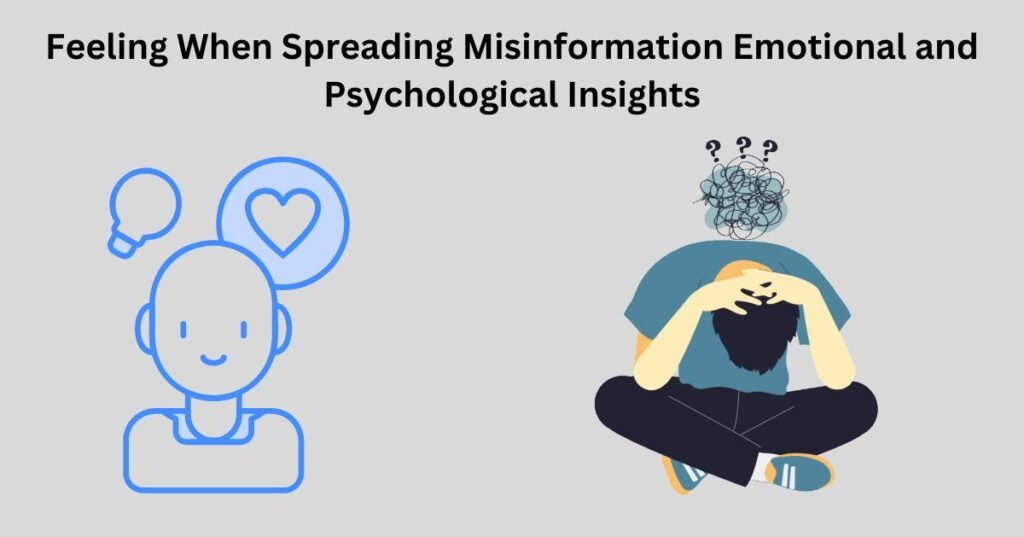In today’s digital age, information travels faster than ever, and with it, the potential for misinformation to spread. Whether intentional or accidental, spreading misinformation can evoke a complex range of emotions in the individual who shares it. The feelings associated with spreading false or misleading information can vary depending on the person’s awareness, intent, and the consequences of their actions. This article explores the psychological and emotional reactions one might experience when spreading misinformation and the importance of understanding the impacts of these actions.
Guilt and Regret: A Common Response
One of the most common emotions people experience when they realize they’ve spread misinformation is guilt. Guilt arises from knowing that the information shared may have caused harm, confusion, or led others astray. Whether the misinformation was shared in a casual conversation, posted on social media, or broadcast through other channels, the individual may feel responsible for the consequences of those actions.
Regret often accompanies guilt. A person might wish they had double-checked the facts, done more research, or asked questions before sharing something they believed to be true. If the misinformation leads to negative consequences—such as confusion in a group, damage to someone’s reputation, or even emotional distress—regret is natural. The emotional weight of knowing you were the one who played a part in spreading false information can be overwhelming.
Shame: The Emotional Burden of Misleading Others
For those who knowingly spread misinformation, shame is a powerful emotion. It can stem from the realization that they’ve intentionally misled others or contributed to the creation of a false narrative. This can be especially true if the individual sees themselves as someone who values honesty and integrity. The discrepancy between their actions and their moral standards can lead to feelings of personal failure and embarrassment.
Shame also occurs when misinformation causes harm or when the person is confronted with the truth. If they are called out for their role in spreading falsehoods, they may experience embarrassment or humiliation. The fear of judgment—whether from friends, family, or the public—can make these feelings even more intense.
Defensiveness: The Reaction to Being Confronted
When confronted with the fact that they have shared misinformation, many people react with defensiveness. Instead of immediately admitting fault, they might try to justify their actions, rationalize why they shared the information, or deny that it was wrong. This is often a protective response aimed at shielding one’s reputation or ego. The desire to avoid looking foolish or losing face can cause an individual to defend their position, even when they know deep down they were mistaken.
This defensiveness can create a barrier to correction. Instead of acknowledging the misinformation and correcting it, the person might double down on their original stance, making it more difficult to rectify the situation. This is particularly common in emotionally charged situations, such as political debates or contentious social issues, where people feel their beliefs are being challenged.
Confusion and Uncertainty: The Doubts That Arise
For those who spread misinformation without realizing it, the initial reaction is often confusion or uncertainty. Many individuals share information based on their understanding or trust in a source. However, when presented with conflicting facts or when the misinformation is revealed, they may be thrown into doubt. The realization that they have been misled or that they have unknowingly misled others can cause mental disarray.
This confusion can lead to cognitive dissonance, a psychological state where a person’s beliefs conflict with their actions. When someone’s values or understanding of a topic don’t align with the information they’ve spread, it can create discomfort. People in this state may start questioning their sources or becoming wary of the information they previously trusted.
Empathy for Those Affected: The Impact of Harm
If the misinformation leads to negative outcomes for others—whether it be emotional harm, damaged relationships, or even more serious consequences like health risks—the person who spread it might feel deep empathy for those affected. This emotional response occurs when the individual realizes that their actions have caused pain or hardship for others. Whether it’s a friend who felt hurt by false rumors or a community misled by incorrect health advice, the emotional toll can be significant.
Empathy can drive a person to take corrective actions, such as apologizing, providing the correct information, or trying to remedy the situation. However, it also can create a sense of helplessness if the damage has already been done and cannot be undone. The person might feel emotionally burdened by the harm they’ve caused, wishing they could turn back time and prevent the misinformation from spreading in the first place.
Anxiety and Fear of Consequences
Once the reality of spreading misinformation sets in, many individuals experience anxiety and fear of consequences. Depending on the severity of the misinformation, the person may fear the social repercussions, such as the breakdown of relationships or a loss of trust. In cases where the misinformation is more significant—such as false information regarding health, legal matters, or politics—there may also be a legitimate fear of legal consequences or public backlash.
The anxiety comes from the uncertainty of how others will react, especially in the age of social media, where the spread of misinformation can go viral. The thought of being “called out” for spreading falsehoods, facing public humiliation, or even being held accountable for the repercussions of the misinformation can lead to considerable stress.
Disappointment in Oneself: The Realization of Mistakes
People who spread misinformation often experience disappointment in themselves when they realize the gravity of their actions. This feeling is particularly strong for those who value truth and accuracy. The realization that they failed to verify facts, examine sources critically, or consider the impact of their words can lead to an overwhelming sense of failure. They may feel they’ve let themselves down by not meeting their own standards.
This self-disappointment can lead to a desire to change behaviors in the future. It may prompt individuals to be more cautious, think more critically, and take extra steps to verify information before sharing it. In some cases, individuals may also experience frustration with their inability to prevent the misinformation from spreading in the first place.
Relief After Correcting the Misinformation
For those who take steps to correct the misinformation they spread, there is often a sense of relief. Admitting the mistake, clarifying the facts, and issuing a public correction can lighten the emotional load and help restore a sense of integrity. Correcting misinformation can be cathartic, as it allows the individual to take responsibility and restore trust with others.
However, this relief is often short-lived, as the damage done by the misinformation may still linger. While correction is important, the emotional aftermath of the situation can still leave a lasting impression. The person may be left with a renewed sense of awareness about the importance of being careful with the information they share moving forward.
Conclusion
The emotions associated with spreading misinformation are varied and complex. Whether it’s guilt, shame, confusion, or defensiveness, these feelings reflect the psychological impact of sharing false or misleading information. While the consequences of spreading misinformation can be far-reaching, it’s important to recognize that these emotions can also be a learning opportunity. Understanding the emotional toll and recognizing the responsibility that comes with sharing information can help reduce the spread of misinformation in the future and promote a more informed, thoughtful society.



